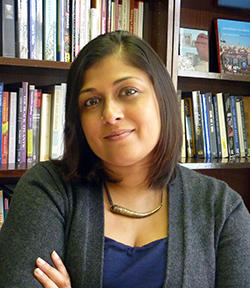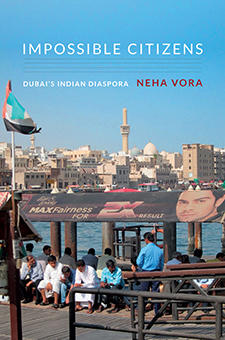Date:
Location:
 The Center for Middle Eastern Studies Outreach Program is pleased to present an author talk by
The Center for Middle Eastern Studies Outreach Program is pleased to present an author talk by
Neha Vora
Assistant Professor of Anthropology, Lafayette College
Moderated by William Granara, CMES Director and Gordon Gray Professor of the Practice of Arabic, Harvard University
About the event:
- A limited number of free copies of Impossible Citizens will be available on a first come, first served basis to Harvard students attending this talk (please have your Harvard ID available).
- This is a brown bag (bring-your-own) lunch event. Cookies and beverages provided.
About the author:
Dr. Neha Vora is assistant professor of anthropology at Lafayette College in Easton, PA. Her research focuses on forms of citizenship, belonging, and exclusion within the contemporary Gulf Arab States. In particular, she explores how economic, political, and social changes in the United Arab Emirates and Qatar shape the daily experiences of the region’s diverse residents, particularly South Asian migrants, who comprise the majority of the population in both countries. She is currently working on a project that investigates the impacts of American branch campuses in Qatar on citizenship and belonging among nationals and foreign residents.
About Impossible Citizens: Dubai's Indian Diaspora: Indian communities have existed in the Gulf emirate of Dubai for more than a century. Since the 1970s, workers from South Asia have flooded into the emirate, enabling Dubai's huge construction boom. They now compose its largest noncitizen population. Though many migrant families are middle-class and second-, third-, or even fourth-generation residents, Indians cannot become legal citizens of the United Arab Emirates. Instead, they are all classified as temporary guest workers. In Impossible Citizens, Neha Vora draws on her ethnographic research in Dubai's Indian-dominated downtown to explore how Indians live suspended in a state of permanent temporariness. While their legal status defines them as perpetual outsiders, Indians are integral to the Emirati nation-state and its economy. At the same time, Indians—even those who have established thriving diasporic neighborhoods in the emirate—disavow any interest in formally belonging to Dubai and instead consider India their home. Vora shows how these multiple and conflicting logics of citizenship and belonging contribute to new understandings of contemporary citizenship, migration, and national identity, ones that differ from liberal democratic models and that highlight how Indians, rather than Emiratis, are the quintessential—yet impossible—citizens of Dubai.
Indian communities have existed in the Gulf emirate of Dubai for more than a century. Since the 1970s, workers from South Asia have flooded into the emirate, enabling Dubai's huge construction boom. They now compose its largest noncitizen population. Though many migrant families are middle-class and second-, third-, or even fourth-generation residents, Indians cannot become legal citizens of the United Arab Emirates. Instead, they are all classified as temporary guest workers. In Impossible Citizens, Neha Vora draws on her ethnographic research in Dubai's Indian-dominated downtown to explore how Indians live suspended in a state of permanent temporariness. While their legal status defines them as perpetual outsiders, Indians are integral to the Emirati nation-state and its economy. At the same time, Indians—even those who have established thriving diasporic neighborhoods in the emirate—disavow any interest in formally belonging to Dubai and instead consider India their home. Vora shows how these multiple and conflicting logics of citizenship and belonging contribute to new understandings of contemporary citizenship, migration, and national identity, ones that differ from liberal democratic models and that highlight how Indians, rather than Emiratis, are the quintessential—yet impossible—citizens of Dubai.
Contact: Sarah Meyrick
As a Title VI National Resource Center, CMES is partially funding this program with U.S. Department of Education grant funds. The content of this program does not necessarily reflect the views or policies of the U.S. Department of Education.
